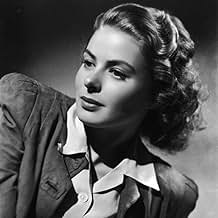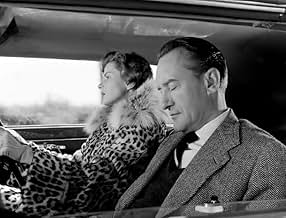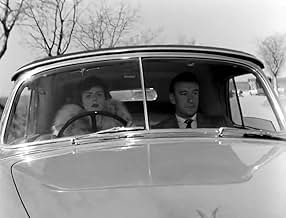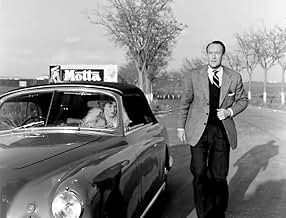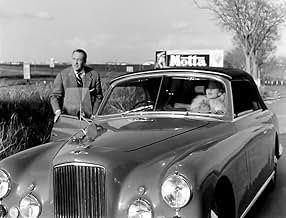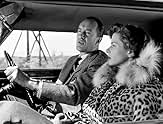NOTE IMDb
7,3/10
13 k
MA NOTE
Un couple marié et malheureux tente de trouver une direction et un sens à sa vie lors de vacances à Naples.Un couple marié et malheureux tente de trouver une direction et un sens à sa vie lors de vacances à Naples.Un couple marié et malheureux tente de trouver une direction et un sens à sa vie lors de vacances à Naples.
- Réalisation
- Scénario
- Casting principal
- Récompenses
- 3 victoires au total
George Sanders
- Alex Joyce
- (as Georges Sanders)
Maria Mauban
- Marie
- (as Marie Mauban)
Anthony La Penna
- Tony Burton
- (as Leslie Daniels)
Natalia Ray
- Natalie Burton
- (as Natalia Rai)
Bianca Maria Cerasoli
- Un'amica di Judy
- (non crédité)
Adriana Danieli
- Un'amica di Judy
- (non crédité)
María Martín
- Judy
- (non crédité)
Lyla Rocco
- La signora Sinibaldi
- (non crédité)
Avis à la une
This is the film that Truffaut writing for Cahiers proclaimed 'the first modern film', going on to praise Rossellini as the father of New Wave. If we don't want to be stridently literal about these things, I agree with him. A bunch of filmmakers who changed the face of cinema in the 60's are all connected to Rossellini and flow out from this film.
At the heart of it we have the familiar trope of a marriage falling apart, melodrama stuff. But modern, meaning understated and without the soaring emotion. We fill the gaps, providing our own understanding of how a relationship works. We participate as players.
So it's about this affair whose nothingness is revealed by the surrounding world, it withers away; the lavish villa with endless views of far horizon, the large, empty veranda where the two of them languish in comfortable lounge chairs. A little outside, it's the countryside of Naples that engulfs them with languid time and hot, lazy weather, a tabula rasa dotted with old ruins.
We're taken on a pilgrimage of these ruins, as the woman looking for a portent that will divine her predicament. The museum filled with statues, the old Roman fort, Vesuvius and Pompeii; Rossellini presents them as mute, ascetic images, images all pertaining to some austere representation into which the woman projects her own world coming to pass. None of them, of course, hold any answers, except as what they are - reminders of the perishable, impermanent world in which we try so hard to grow roots.
Meanwhile, back in Capri, the cynical husband is squandered in his own aimless voyage for something that will fill the time. He courts a woman, much like he did his wife perhaps all those years ago. He feigns and thrusts for desire. Finally he returns home with the same void gnawing inside. Passable stuff, as in La Notte some years later, but the important stuff is with the woman's journey; the Stromboli part of the film as it were.
It is all about the painful process by which ruins are made, time into memory. We are privy to one such enactment in ancient Pompeii (then still being excavated): into the hole once occupied by a dead body, that holds nothing now and is hollow except with shape, the archaeologists pour plaster in order to surmise the shape of that past. Yet what they retrieve is merely the replica of empty space.
Oh, there's the stupidly saccharine finale, no doubt imposed once again on Rossellini by his Italian distributors at Titanus. It's something to be on the lookout for, for how marvelously Rosssellini confounds his censors.
As the couple magically decide they finally love each other, the mob of peasants that surrounds them - participating in some local religious ceremony - cries out in jubilee about 'il miracolo!'. The two lovers are swept aside by people rushing to see, reunited in this nonsensical miracle. The final shot is of police offers looking stern as they inspect the scene, like the censors would the film. Whether or not we choose to accept the one miracle, boils down to whether or not we would the other.
I want to summarize Rossellini here; he's largely forgotten now - probably because when the cinema he envisioned finally took hold, he had already abandoned it. But he's one of the most important filmmakers we have known. You find out that so much of what eventually blossomed with film, grew first roots with him. His transcendent vision was exceptional.
The only misgiving - slight, very slight - is that everything is relatively precise with meaning. Empty space abounds here, the pure ascetic images, yet is mostly filled for us. We're left with simply unearthing the cast, reading the signs. Perhaps I'm saying this because he envisioned so far ahead that I'm comparing him in my mind with later filmmakers who abstracted deeper. No matter, Rossellini ushered cinema far enough.
Now it would be Antonioni's turn to shoulder it; he would supply the breathing, incomplete space into which the imagination can pour into. There is no cast that explains away with him, only the means of immersion into a space empty, waiting-to-be-filled with us (not by us). The ensuing voyage that finally brings us to The Passenger is one of the most fascinating that I know of, but that is covered elsewhere.
At the heart of it we have the familiar trope of a marriage falling apart, melodrama stuff. But modern, meaning understated and without the soaring emotion. We fill the gaps, providing our own understanding of how a relationship works. We participate as players.
So it's about this affair whose nothingness is revealed by the surrounding world, it withers away; the lavish villa with endless views of far horizon, the large, empty veranda where the two of them languish in comfortable lounge chairs. A little outside, it's the countryside of Naples that engulfs them with languid time and hot, lazy weather, a tabula rasa dotted with old ruins.
We're taken on a pilgrimage of these ruins, as the woman looking for a portent that will divine her predicament. The museum filled with statues, the old Roman fort, Vesuvius and Pompeii; Rossellini presents them as mute, ascetic images, images all pertaining to some austere representation into which the woman projects her own world coming to pass. None of them, of course, hold any answers, except as what they are - reminders of the perishable, impermanent world in which we try so hard to grow roots.
Meanwhile, back in Capri, the cynical husband is squandered in his own aimless voyage for something that will fill the time. He courts a woman, much like he did his wife perhaps all those years ago. He feigns and thrusts for desire. Finally he returns home with the same void gnawing inside. Passable stuff, as in La Notte some years later, but the important stuff is with the woman's journey; the Stromboli part of the film as it were.
It is all about the painful process by which ruins are made, time into memory. We are privy to one such enactment in ancient Pompeii (then still being excavated): into the hole once occupied by a dead body, that holds nothing now and is hollow except with shape, the archaeologists pour plaster in order to surmise the shape of that past. Yet what they retrieve is merely the replica of empty space.
Oh, there's the stupidly saccharine finale, no doubt imposed once again on Rossellini by his Italian distributors at Titanus. It's something to be on the lookout for, for how marvelously Rosssellini confounds his censors.
As the couple magically decide they finally love each other, the mob of peasants that surrounds them - participating in some local religious ceremony - cries out in jubilee about 'il miracolo!'. The two lovers are swept aside by people rushing to see, reunited in this nonsensical miracle. The final shot is of police offers looking stern as they inspect the scene, like the censors would the film. Whether or not we choose to accept the one miracle, boils down to whether or not we would the other.
I want to summarize Rossellini here; he's largely forgotten now - probably because when the cinema he envisioned finally took hold, he had already abandoned it. But he's one of the most important filmmakers we have known. You find out that so much of what eventually blossomed with film, grew first roots with him. His transcendent vision was exceptional.
The only misgiving - slight, very slight - is that everything is relatively precise with meaning. Empty space abounds here, the pure ascetic images, yet is mostly filled for us. We're left with simply unearthing the cast, reading the signs. Perhaps I'm saying this because he envisioned so far ahead that I'm comparing him in my mind with later filmmakers who abstracted deeper. No matter, Rossellini ushered cinema far enough.
Now it would be Antonioni's turn to shoulder it; he would supply the breathing, incomplete space into which the imagination can pour into. There is no cast that explains away with him, only the means of immersion into a space empty, waiting-to-be-filled with us (not by us). The ensuing voyage that finally brings us to The Passenger is one of the most fascinating that I know of, but that is covered elsewhere.
Few films have inspired as much critical folderol as "Journey to Italy". Godard considered it a masterpiece, which is always a cause for worry; he had a sharp eye for directing technique, but not so much for storytelling. "Journey to Italy" reflects this defect, and cannot be called a masterpiece without caveat.
The title is certainly accurate. We follow Alex (George Sanders) and Katherine Joyce (Ingrid Bergman) on a journey through Italy, on their way to sell a mansion Alex' uncle left him, and enjoy some time together.
Their marriage is unhappy. We gather as much from the opening scene, when Alex requests that he drives instead of Katherine. Why so? To keep him awake, he says. Clearly, that's not the whole truth. He may think lowly of her driving skills. Or maybe he can't abide her being in control. Or is he really just bored? It's hard to tell with a sarcast like Sanders.
Katherine feels uncomfortable too, but doesn't call her husband out directly. 'It didn't occur to me that it'd be so boring for you to be alone with me,' she says instead. 'What's that got to do with it? I'm just bored because I've got nothing to do,' Alex replies. Neither is saying what they wanted to say.
That is "Journey to Italy" in a nutshell. Alex and Katherine's marriage could be saved if ever the two were honest with each other, but their emotional defences block every attempt. The tragedy is not that the two don't see what is happening. The tragedy is that they do, and fail to change their ways. Once living with a person for a certain period to time, one cannot suddenly play straight. Alex and Katherine are stuck in vicious circle they have created for themselves.
Rosselini is partially successful in portraying this tragedy. The parts that play out like the above scene have been rightly praised for their bold, elusive storytelling. The best scenes are those in which nothing of apparent notice happens: Katherine takes three tourist tours (set to foreboding music); Alex goes to a party and fails to enjoy himself. What goes on in their heads is left to guess. Antonioni was undoubtedly inspired by "Journey to Italy" when he employed the same technique in his Trilogy ("L'avventura", "La notte", "L'eclisse") -- to greater effect.
Comparison between the directors shows where Rosselini falls short. Note how Antonioni always stays on the surface. He complements the superficial quibbles of his characters with crystal-clear images, and leaves digging to his viewers. Rossellini, meanwhile, wavers. One scene, his characters speak in those natural and shrouded sentences. The next, they indulge in syrupy Hollywood platitudes, or worse: voice-over narration, to directly tell the audience how they feel. The script feels schizophrenic, possibly reflecting its two screenwriters. It is bold and elusive as often as safe and uninvolving.
As such, "Journey to Italy" can only be recommended with reservations. That certain critics fail to provide these is a serious fault. Imagine the Michelin Guide awarding a restaurant three stars despite part of their dishes being undercooked. To appreciate "Journey to Italy", one must seek out the well-done bits.
The title is certainly accurate. We follow Alex (George Sanders) and Katherine Joyce (Ingrid Bergman) on a journey through Italy, on their way to sell a mansion Alex' uncle left him, and enjoy some time together.
Their marriage is unhappy. We gather as much from the opening scene, when Alex requests that he drives instead of Katherine. Why so? To keep him awake, he says. Clearly, that's not the whole truth. He may think lowly of her driving skills. Or maybe he can't abide her being in control. Or is he really just bored? It's hard to tell with a sarcast like Sanders.
Katherine feels uncomfortable too, but doesn't call her husband out directly. 'It didn't occur to me that it'd be so boring for you to be alone with me,' she says instead. 'What's that got to do with it? I'm just bored because I've got nothing to do,' Alex replies. Neither is saying what they wanted to say.
That is "Journey to Italy" in a nutshell. Alex and Katherine's marriage could be saved if ever the two were honest with each other, but their emotional defences block every attempt. The tragedy is not that the two don't see what is happening. The tragedy is that they do, and fail to change their ways. Once living with a person for a certain period to time, one cannot suddenly play straight. Alex and Katherine are stuck in vicious circle they have created for themselves.
Rosselini is partially successful in portraying this tragedy. The parts that play out like the above scene have been rightly praised for their bold, elusive storytelling. The best scenes are those in which nothing of apparent notice happens: Katherine takes three tourist tours (set to foreboding music); Alex goes to a party and fails to enjoy himself. What goes on in their heads is left to guess. Antonioni was undoubtedly inspired by "Journey to Italy" when he employed the same technique in his Trilogy ("L'avventura", "La notte", "L'eclisse") -- to greater effect.
Comparison between the directors shows where Rosselini falls short. Note how Antonioni always stays on the surface. He complements the superficial quibbles of his characters with crystal-clear images, and leaves digging to his viewers. Rossellini, meanwhile, wavers. One scene, his characters speak in those natural and shrouded sentences. The next, they indulge in syrupy Hollywood platitudes, or worse: voice-over narration, to directly tell the audience how they feel. The script feels schizophrenic, possibly reflecting its two screenwriters. It is bold and elusive as often as safe and uninvolving.
As such, "Journey to Italy" can only be recommended with reservations. That certain critics fail to provide these is a serious fault. Imagine the Michelin Guide awarding a restaurant three stars despite part of their dishes being undercooked. To appreciate "Journey to Italy", one must seek out the well-done bits.
Seems long and drawn out until you get to the final moment which is a marvellous thing, then you realise how great a film it was, in hindsight.
Possibly influenced Bunuel - some of the tree lined avenues and the religious saturation of a culture, the slowness of the story, it all reminded me of Bunuel. It's also acknowledged to be an influence on Godard's Contempt and it was interesting to see how it inspired parts of that film - the estranged couple cast against stunning Italian Neapolitan scenery. Must be a great story for it to have been filmed so well twice.
Possibly influenced Bunuel - some of the tree lined avenues and the religious saturation of a culture, the slowness of the story, it all reminded me of Bunuel. It's also acknowledged to be an influence on Godard's Contempt and it was interesting to see how it inspired parts of that film - the estranged couple cast against stunning Italian Neapolitan scenery. Must be a great story for it to have been filmed so well twice.
Viaggio in Italia (1954) was shown in the United States with the translated title Voyage to Italy. The movie was co-written and directed by Roberto Rossellini.
The film stars Ingrid Bergman as Katherine Joyce and George Sanders as Alex Joyce, her husband. They are both very British. (Sanders was British. Bergman couldn't handle the English accent.) They no longer love each other. They decide to go to Naples to try to salvage what's left of their marriage.
A marriage that's falling apart is a classic narrative. A trip to try to repair the damage is also classic. What's not classic is why anyone could believe that this marriage could be saved. Sanders tells Bergman that when he's alone with her he's bored. (Right.) He leaves Naples for a few days, and when he returns he picks up a prostitute rather than return to Bergman. He drives the prostitute to a park, and then takes home without touching her. (Right.) OK--it's 1954, but even so that's a weird scene.
The ending of the film is so bizarre that it defies description, so I won't describe it. Voyage to Italy is considered a Very Important Movie, and has a solid IMDB rating of 7.4. Maybe fellow raters saw something in the movie that I didn't see, or maybe they saw a different movie. I rated it 6, and that was a gift to honor Bergman's acting skills.
The film stars Ingrid Bergman as Katherine Joyce and George Sanders as Alex Joyce, her husband. They are both very British. (Sanders was British. Bergman couldn't handle the English accent.) They no longer love each other. They decide to go to Naples to try to salvage what's left of their marriage.
A marriage that's falling apart is a classic narrative. A trip to try to repair the damage is also classic. What's not classic is why anyone could believe that this marriage could be saved. Sanders tells Bergman that when he's alone with her he's bored. (Right.) He leaves Naples for a few days, and when he returns he picks up a prostitute rather than return to Bergman. He drives the prostitute to a park, and then takes home without touching her. (Right.) OK--it's 1954, but even so that's a weird scene.
The ending of the film is so bizarre that it defies description, so I won't describe it. Voyage to Italy is considered a Very Important Movie, and has a solid IMDB rating of 7.4. Maybe fellow raters saw something in the movie that I didn't see, or maybe they saw a different movie. I rated it 6, and that was a gift to honor Bergman's acting skills.
The death of her uncles brings married couple Catherine and Alex to Naples in order that they might handle the sale of their inherited villa. From the first journey they make together, there is a real frost in the air and an apparent lack of love between them. After several difficult nights together where they acknowledge the tenuous state of their relationship and decide to use the holiday to spend time apart as opposed to being alone together. As Catherine heads off to catch up on the history and museums of the area while Alex idles around Capri, flirting and enjoying the friendly company of the young ladies he meets there.
It has been said that not a great deal happens in this film and those that say this are mostly correct but they are not being critical of this fact, merely stating it. The basic plot is: couple comes to Italy with marriage problems and, in between fights, travel around the area and that's about it in terms of definable action. However to simply leave it at that is to do this film a great injustice because so much of it is about more than just what is happening at any given moment and it is actually a beautifully shot and moving story of love within marriage. We join the story where Catherine and Alex (in a very well drawn marriage) have both come to the conclusion that their marriage must nearly be over. Neither really wants that but neither can manage to make things change; frustrated they go off and travel around Naples alone.
At this point the film balances two aspects with real skill. On one hand the film is a really intimate travel film, not just focusing on the sweeping scenery of the region but getting closer, looking at the specific histories, sites of interest and the people that reside there. Its strength is that it is never just about this because the scenery is just the backdrop for the two characters to discover themselves undergoing soul searching but in a casual manner, not a heavy, gut wrenching fashion, more of a dawning realisation than anything else. This is subtly down and all the better for it; a convincing marriage that has been worn away to the point that the couple have simply forgotten to just be in love and instead have allowed other aspects of their relationship (the sarcasm, the niggling, the familiarity) to become the main part of their daily interactions. Those who have not been married or in a long-term relationship may not 'get' this film but I can assure you that it will likely be recognisable to you if you have been.
The chemistry between Sanders and Bergman is very convincing I felt like there had been love between them but it had just been forgotten. Individually they both played their parts really well there was no real 'eureka in the bathtub' moment until the end but, up till then, we had seen both the characters pick up little things along the way in a very able manner. The support cast were all good trimming round the edges but, in the version I saw, the dubbing into English was a little heavy at times and made it difficult to judge their performances. However the three stars here are all very good and drive the film without anybody else. Three stars? Sanders, Bergman and Naples itself.
Overall this is a slow film that has very little happening in it and, for that reason, it may frustrate some modern audiences who prefer their romantic dramas to have more spark and energy to it however this is much more convincing for being subtle and elegant. The playing of Sanders and Bergman is pitch perfect and help keep our interest in their marriage alive, while the detail and sweep of Naples is well used as a suitable backdrop for them to rediscover their love against. If it were remade today it would be a massively different film, but this should be enjoyed for what it is a great film that is of its time and should be enjoyed as such even if it requires at least a bit of patience.
It has been said that not a great deal happens in this film and those that say this are mostly correct but they are not being critical of this fact, merely stating it. The basic plot is: couple comes to Italy with marriage problems and, in between fights, travel around the area and that's about it in terms of definable action. However to simply leave it at that is to do this film a great injustice because so much of it is about more than just what is happening at any given moment and it is actually a beautifully shot and moving story of love within marriage. We join the story where Catherine and Alex (in a very well drawn marriage) have both come to the conclusion that their marriage must nearly be over. Neither really wants that but neither can manage to make things change; frustrated they go off and travel around Naples alone.
At this point the film balances two aspects with real skill. On one hand the film is a really intimate travel film, not just focusing on the sweeping scenery of the region but getting closer, looking at the specific histories, sites of interest and the people that reside there. Its strength is that it is never just about this because the scenery is just the backdrop for the two characters to discover themselves undergoing soul searching but in a casual manner, not a heavy, gut wrenching fashion, more of a dawning realisation than anything else. This is subtly down and all the better for it; a convincing marriage that has been worn away to the point that the couple have simply forgotten to just be in love and instead have allowed other aspects of their relationship (the sarcasm, the niggling, the familiarity) to become the main part of their daily interactions. Those who have not been married or in a long-term relationship may not 'get' this film but I can assure you that it will likely be recognisable to you if you have been.
The chemistry between Sanders and Bergman is very convincing I felt like there had been love between them but it had just been forgotten. Individually they both played their parts really well there was no real 'eureka in the bathtub' moment until the end but, up till then, we had seen both the characters pick up little things along the way in a very able manner. The support cast were all good trimming round the edges but, in the version I saw, the dubbing into English was a little heavy at times and made it difficult to judge their performances. However the three stars here are all very good and drive the film without anybody else. Three stars? Sanders, Bergman and Naples itself.
Overall this is a slow film that has very little happening in it and, for that reason, it may frustrate some modern audiences who prefer their romantic dramas to have more spark and energy to it however this is much more convincing for being subtle and elegant. The playing of Sanders and Bergman is pitch perfect and help keep our interest in their marriage alive, while the detail and sweep of Naples is well used as a suitable backdrop for them to rediscover their love against. If it were remade today it would be a massively different film, but this should be enjoyed for what it is a great film that is of its time and should be enjoyed as such even if it requires at least a bit of patience.
Le saviez-vous
- AnecdotesGeorge Sanders, in his 1960 autobiography, wrote at length about the making of this film, which he found an exasperating and unpleasant experience. He spoke witheringly about Roberto Rossellini, whom he characterized as being more interested in scuba diving than in film-making. Although the tone of his remarks is one of amusement, it became known that Sanders (who had admired earlier Rossellini films) had been deeply affected by exposure to a style of film-making quite foreign to his previous experience, and had spent the shoot feeling frustrated and angry, often bursting into uncontrollable tears.
- GaffesAfter deciding to leave Pompeii and walking down the stairs for the exit, the arm and shoulder of a crew member appear in the lower right side of the screen.
- Citations
Alex Joyce: What noisy people! I've never seen noise and boredom go so well together.
Katherine Joyce: Oh I don't know, Uncle Homer lived here for 40 years without getting bored.
Alex Joyce: Uncle Homer was not a normal person.
- ConnexionsEdited into Histoire(s) du cinéma: Fatale beauté (1994)
Meilleurs choix
Connectez-vous pour évaluer et suivre la liste de favoris afin de recevoir des recommandations personnalisées
- How long is Journey to Italy?Alimenté par Alexa
Détails
Box-office
- Montant brut mondial
- 20 072 $US
- Durée1 heure 25 minutes
- Couleur
- Mixage
- Rapport de forme
- 1.37 : 1
Contribuer à cette page
Suggérer une modification ou ajouter du contenu manquant

Lacune principale
By what name was Voyage en Italie (1954) officially released in India in English?
Répondre

